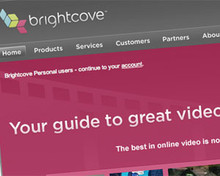
In that time it has added some heavyweight news clients to the roster of companies using its online video technology. The Guardian recently joined The Telegraph, Emap, IPC Media, Hachette and a host of other publishers in using Brightcove to power the video on its website.
Adam Berrey, VP of marketing & strategy with Brightcove, talked to Journalism.co.uk about how video news on the web would develop over the next year.
Are news broadcasters less interested or slower on the uptake with online video, something they could see as a rival and a destructive force to their appointment-to-view TV schedules, than newspapers?
"They're not less interested, they are already doing video. For a broadcaster to put video on their website it extends their reach, it extends their platform, it gives their audience the ability to time shift and place shift, which is incredibly powerful. For newspaper it's an entirely new medium.
"Some of the passion comes from the fact that at newspapers you have new digital media groups using video, they have got something wholly that they did not have a year ago. The spirit is different, but the interest in it is not that different, there are differences but they are more subtle."
News video has prospered on the web, along with movie trailers and music videos, as its short form suits current technological limitations.
How will the nature of the material watched on the web grow as broadcast-quality, full-screen longer programming becomes available?
"What you'll see is a gradual but steady redistribution of consumer's consumption time to include more internet-based media at the expense of other mediums.
"That does not mean that those other mediums will go away wholesale. They have characteristics that you don't get with today's technology for online media.
"[Similarly] there are ways in which online media does things that aren't done well [with broadcast TV]. You can deliver much more niche content, because people can discover it. You can create niche communities around the content, so you can interact with other people online in a way that you can't in any other medium.
"Arguably, those community aspects of the web are the most defining feature of the medium; I think they are also the parts of the medium - for folks that are developing multi-platform strategies - that are some of the hardest things to get right.
"It's one thing to be able to produce content in one medium then produce it for the web. It's another thing to realise that on the web you can't just produce content you have to create community. That is an additional set of activities, but it is central to the medium."
Mobile has been the next-big-thing for what seems like an age. Will Brightcove be looking to develop mobile video in Europe?
"We have heard a lot of talk about mobile video, but we have not seen a lot of action, so the part of mobile that we will focus on first is upload from the phone.
"I think watching on the phone is less of a market opportunity than people were hoping at one point. It hasn't really taken off how everyone expected.
"It may just be that watching a video on a tiny little phone isn't that interesting, it may be because the market just isn't ready for it, time will tell on that.
"Upload from a phone is very interesting to lots of organisations who would like it from a news perspective…I think we may do some stuff around that."
Is the limited ability to search the web for video holding you back?
"It's not as much of a problem as you'd think if you just look at the video search engines…since the power behind web video is its context, that context is usually generated with text.
"While consumers might have trouble discovering specific videos they don't have trouble discovering the text and the content around the videos and because of the way it's woven into that context it's making it pretty straightforward for people to find what they are looking for. I think that's a lot less of an issue."
Is viral video where content producers/publishers are ultimately heading?
"What we see the smart companies doing is using viral video as part of a strategy to drive people to their sites but they don't want to put all their content into viral video distribution, not all of it's appropriate but also you want to have aggregated value on your website too, to bring consumers there and to keep them coming back so you can monetise them.
"It's really something on which we try to give the content owners a lot of control, also video is very heterogeneous. What works for one genre, one show, or one piece of content, you might not want to do with another one. So you need a lot of choice and control to be able to adapt what you are doing to your needs.
"It's harder to sell advertising in viral video because the advertisers will tell you 'we don't know what else is around the video, maybe that video got stuck in a website that's trashing us'. So they don't know the context of the video so you just can't command as high a CPM as you can on your own site."
Free daily newsletter
If you like our news and feature articles, you can sign up to receive our free daily (Mon-Fri) email newsletter (mobile friendly).
Related articles
- BBC Ideas aims to inform and entertain audiences with short factual videos
- NBC launches experimental video hub for audiences on social media
- The Bay Area Video Coalition aims to make the process of digitising analogue video more accessible to the public
- 3 approaches to video from Bloomberg, WSJ and VGTV
- Brightcove launches new video-sharing tools in Zeit Online deal









